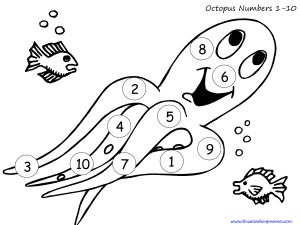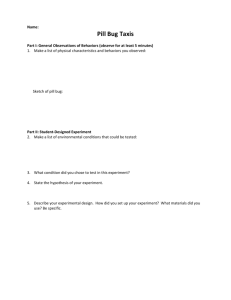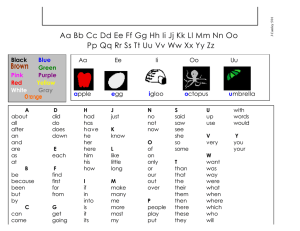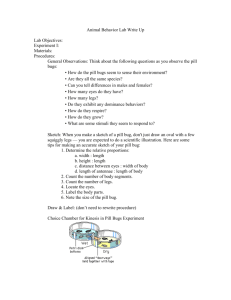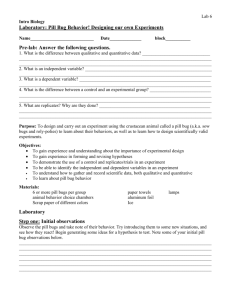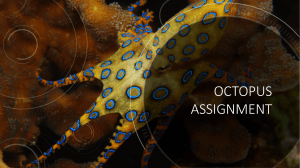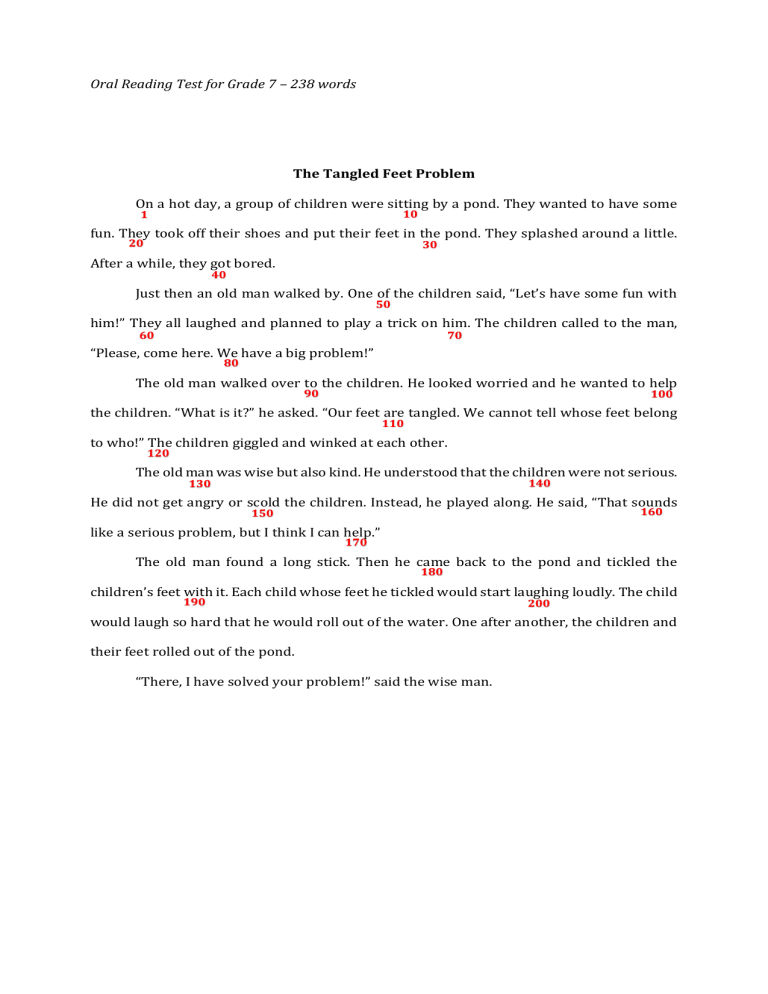
Oral Reading Test for Grade 7 – 238 words The Tangled Feet Problem On a hot day, a group of children were sitting by a pond. They wanted to have some 10 1 fun. They took off their shoes and put their feet in the pond. They splashed around a little. 20 30 After a while, they got bored. 40 Just then an old man walked by. One of the children said, “Let’s have some fun with 50 him!” They all laughed and planned to play a trick on him. The children called to the man, 60 70 “Please, come here. We have a big problem!” 80 The old man walked over to the children. He looked worried and he wanted to help 90 100 the children. “What is it?” he asked. “Our feet are tangled. We cannot tell whose feet belong 110 to who!” The children giggled and winked at each other. 120 The old man was wise but also kind. He understood that the children were not serious. 140 130 He did not get angry or scold the children. Instead, he played along. He said, “That sounds 160 150 like a serious problem, but I think I can help.” 170 The old man found a long stick. Then he came back to the pond and tickled the 180 children’s feet with it. Each child whose feet he tickled would start laughing loudly. The child 190 200 would laugh so hard that he would roll out of the water. One after another, the children and their feet rolled out of the pond. “There, I have solved your problem!” said the wise man. Oral Reading Test for Grade 8 – 249 words Roly-Poly Pill Bugs Some people are afraid of bugs such as spiders or beetles. But there is one bug that 10 1 just about everybody likes—pill bugs. If you ever pick one up, you know why its nickname is 20 30 “roly-poly.” A pill bug rolls up into a tight little ball to protect itself. This bug is scared of you, 40 50 not the other way around! 60 These little gray or brown bugs can be found almost everywhere in the United States 70 except the desert. That is because they need to stay moist. But they can live in dry places like 80 90 California thanks to lawn sprinklers. One of their favorite hang-outs is under damp flower 100 pots. Did you know that pill bugs have something in common with kangaroos? After her eggs 120 110 hatch, the mother pill bug carries her young in a pouch under her belly. The little pill bugs 140 130 stay there until they are big enough to be on their own. 150 Pill bugs also have something in common with snakes. Just as snakes shed their skin 170 160 when it gets too small, pill bugs do too. This is called “molting.” A pill bug molt about five 180 times until it is full-grown. 190 Pill bugs are a little like owls, too. Pill bugs are nocturnal, meaning they are most 200 active at night. That is when they most like to wander around and look for food. And just like earthworms, pill bugs help break down plants in the soil. Pill bugs aren’t just nice bugs. They are also interesting ones! Oral Reading Test for Grade 9 – 258 words Humming Birds The most beautiful humming birds are found in the West Indies and South America. 1 10 The crest of the tiny head of one of these birds shines like a sparkling crown of colored light. 30 20 The shades of color that adorn its breast are equally brilliant. As the bird flits from one flower 40 50 to another, it looks more like a bright flash of sunlight than it does a living being. 60 You ask, why are they called humming birds? It is because they make a soft, humming 80 70 noise by the rapid motion of their wings —a motion so rapid, that as they fly, you can hardly 90 100 see that they have wings. One day when walking in the woods, I found the nest of one of the smallest humming 120 110 birds. It was about half the size of a very small hen’s egg, and it was attached to a twig no 130 140 thicker than a steel knitting needle. It seemed to have been made of cotton fibers and was 150 160 covered with the softest bits of leaf and bark. It had two eggs in it, and each was about as 170 180 large as a small sugarplum. When you approach the spot where one of these birds has built its nest, you need to 190 200 be careful. The mother bird will dart at you and try to peck you. Its sharp beak may hurt you. The poor little thing knows no other way of defending its young, and instinct teaches it that you might carry off its nest if you find it. Oral Reading Test for Grade 10 – 380 words The Bread Lesson My dad has watermelon-size biceps, a neck like an inner tube, and enormous, 5 1 10 muscular hands that make him seem like he’s always wearing baseball mitts. He doesn’t 15 25 20 seem like the kind of guy who would bake great bread, but he is and he does. Every Saturday 30 40 35 45 he puts on his chef’s apron, rolls up his sleeves, breaks out a bag of flour, and produces two 50 55 60 65 loaves of homemade bread. When he’s done, the whole house smells delicious, and I can’t 70 80 75 wait for a hot slice smothered with yellow, melting butter. 90 85 The rest of the week, Dad is a car mechanic, which involves lots of heavy lifting, 100 95 tightening, unscrewing, shoving, shaking, yanking, and banging. People tend to think of their 110 cars as metallic members of the family, so there’s lots of pressure on Dad to make sure pumps 120 130 pump, steering steers, and brakes brake. The shop where Dad works is understaffed, so he’s 140 150 under a lot of stress. Sometimes I worry he’s going to overheat and blow a gasket or 160 something, like some old car. I think Dad began baking bread to help him relax. I see him in 180 170 the kitchen, working on a spongy hunk of dough—punching and pounding it into submission. 200 190 I’ve been feeling kind of stressed out myself since I found out I didn’t qualify for the 220 210 swim team. Now I’ll have to wait a whole year to try out again; that might as well be a million 220 230 years. Plus, I’m taking some tough classes this year, and my best friend moved away. 240 I think Dad knew I was feeling pressure. He sat next to me on the sofa last Saturday 260 250 and asked me how things were going. I said OK, even though I didn’t feel OK at all. He looked 270 280 at me for a moment, then he said it was time for me to help. He got up from the sofa and 300 290 headed to the kitchen. 310 I couldn’t imagine what help I could offer. Still, I followed right behind him. Once we 320 were standing by the counter, Dad gave me one of his old aprons. He slipped it on over my 330 340 head and tied it in the back with such obvious pride that you’d think I was being knighted, 350 which felt kind of silly but also kind of nice. I was being initiated as a bread-baker. Bruce and the Spider 1 There was once a king of Scotland whose name was Robert Bruce. He needed to be both brave and wise because the times in which he lived were wild and rude. The King of England was at war with him and had led a great army into Scotland to drive him out of the land. Battle after battle had been fought. Six times Bruce had led his brave little army against his foes and six times his men had been beaten and driven into flight. At last his army was scattered, and he was forced to hide in the woods and in lonely places among the mountains. One rainy day, Bruce lay on the ground under a crude shed listening to the patter of the drops on the roof above him. He was tired and unhappy. He was ready to give up all hope. It seemed to him that there was no use for him to try to do anything more. As he lay thinking, he saw a spider over his head making ready to weave her web. He watched her as she toiled slowly and with great care. Six times she tried to throw her frail thread from one beam to another, and six times it fell short. “Poor thing,” said Bruce: “you, too, know what it is to fail. ” But the spider did not lose hope with the sixth failure. With still more care, she made ready to try for the seventh time. Bruce almost forgot his own troubles as he watched her swing herself out upon the slender line. Would she fail again? No! The thread was carried safely to the beam and fastened there. “I, too, will try a seventh time!” cried Bruce. He arose and called his men together. He told them of his plans and sent them out with messages of cheer to his disheartened people. Soon there was an army of brave Scotchmen around him. Another battle was fought, and the King of England was retreated to his own country. After that day, no one by the name of Bruce would ever hurt a spider. The lesson which the little creature had taught the king was never forgot ten. Magician of the Sea What do three hearts, eight arms, and one huge brain add up to? An octopus, a creature that can do amazing things. Octopuses are extremely intelligent. They can learn new things just like humans. They’ve even learned a few tricks to get them out of sticky situations. If an octopus is threatened by a predator, such as a shark or bird, it can use some pretty incredible skills to get away. Octopuses don’t have teeth or sharp claws to defend themselves. Instead, they use more clever ways to fool their attackers. Octopuses like to hide themselves in the sand on the bottom of the ocean floor. How you ask? Well, the octopus is like a chameleon because it can change the color of its skin to match the sand. And this color change, or camouflage, happens in less than a minute. Some octopuses like to stay in more shallow water where there are rocks and coral. Because octopuses are invertebrates, meaning they don’t have backbones, they can squeeze themselves into small spaces between the rocks to get out of reach of their predators. Another way an octopus can hide is by shooting ink. An octopus uses a part of its body called a siphon to shoot ink into the water. The ink forms a cloud that hides the octopus. By the time the ink clears and the predator can see again, the octopus has swum away or hidden. It’s very much like a magician doing a vanishing act. If you think that’s a neat trick, then you’ll love what else these creatures have up their sleeves. If an octopus is being attacked, it can actually make itself look like a venomous sea snake. It will bury itself in the sand, keeping two arms visible. It will change the color of those arms to match a sea snake. But what if there’s no time to hide? If an octopus is in trouble, it can break off one of its arms. The arm will then change colors and squirm around in the water to distract the predator while the octopus swims away to safety. Don’t worry though. The octopus’s arm will grow back. There is one kind of octopus that has venom to use in defense. The blue-ringed octopus is tiny; it could fit in the palm of your hand. Predators might think this size makes the octopus a great snack, but they know to stay away. The blue-ringed octopus is very poisonous and can kill predators much larger than itself, including humans. So the next time you see an octopus in the aquarium or while you’re snorkeling, remember that inside that oversized head is a very large brain, making them a clever addition to the sea.
